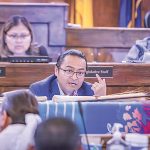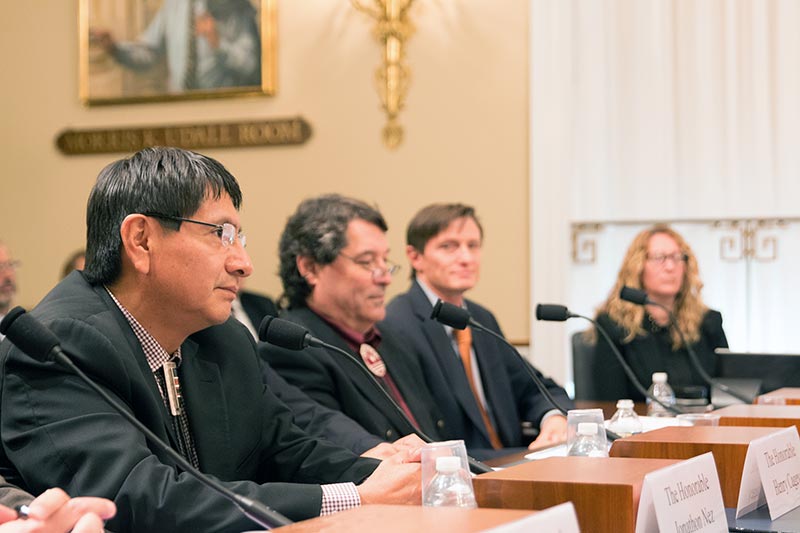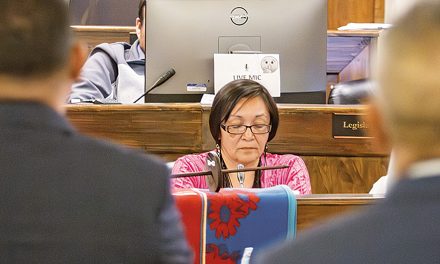
Navajo, other tribes call land-use bill a step in the right direction

Cronkite News | Isaac Windes Navajo Nation Vice President Jonathan Nez, left, said that tribes have to deal with layers of federal bureaucracy for most projects, adding “years … and a lot of resources” to their length and cost.

Cronkite News | Isaac Windes
Navajo Nation Vice President Jonathan Nez, left, said that tribes have to deal with layers of federal bureaucracy for most projects, adding “years … and a lot of resources” to their length and cost.
By Isaac Windes
Cronkite News
WASHINGTON
Tribal leaders backed a House bill Wednesday that would give tribes the ability to control more of their land, instead of having to get federal approval for virtually any use.
Nez touts land-use bill, notes ways to improve it
By Arlyssa Becenti
Navajo Times
WINDOW ROCK – Navajo Nation Vice President Jonathan Nez took his message of Ta’áá hwóajit’éego to Washington, D.C., Wednesday as he testified and voiced support for the American Indian Empowerment Act of 2017.
“I strive to live by this saying and I think that when Congress takes action on legislation such as this, we are working together to support tribal resiliency, self-governance and empowerment,” said Nez at a meeting of the House Subcommittee on Indian Insular and Alaska Native Affairs.
The act, sponsored by Rep. Don Young, R-Alaska, is a tribal lands bill, a version of which was introduced in 2012 to give tribes self-governance when it comes to their lands. The act would create a process for tribes to take lands out of trust and place them into restricted fee status.
Similar to trust lands, restricted fee land cannot be removed from tribal ownership and is protected from taxation. This could help tribes control parts of tribal lands as they pursue economic or natural resource development.
“I’m confident in the American Indian and Alaskan Native ability to get the job done,” said Young. “All I’m trying to do with this bill is to let you guys be more self determined. I want to make sure you have that ability.”
In his testimony, Nez gave four highlights of the bill he believed beneficial, but he also gave three suggestions on how the bill could be improved.
“Indian land should not be treated like federal public land,” said Nez. “Tribal nation land should be treated as tribal nation land and nothing else.”
With this mindset, Nez said, it could help the Navajo Nation in housing, utility infrastructure build-out, or economic development by eliminating unnecessary and duplicative bureaucratic reviews.
Other highlights he agreed with were: the decision to transfer to restricted fee land is entirely up to the tribal nation and no one else; protection against the loss or alienation of Indian lands; and “nothing in this section shall be construed to diminish the Federal trust responsibility to any Indian tribe.”
“I’m open to improving my bills,” said Young. “You have to work with us … I don’t have pride in the birth of this, it all came from the Native groups.”
Nez suggested that the bill should have one further option for tribes to revert land back to trust from restricted fee land if they deem it in their best interest; make it clear that tribes have exclusive taxing authority over the land, not states and local governments; and acknowledging that a tribe has civil jurisdiction over all incidents on restricted fee land.
“I am encouraged by the reception from the subcommittee on the testimony,” said Nez. “I think if the sponsor is asking us to make changes I think we should be able to make progress.”
Nez was one of five tribal leaders and advocates who presented at the subcommittee.
The American Indian Empowerment Act would let tribes shift federally controlled trust land to “restricted fee land,” a move that could save millions of dollars that tribes now spend on “burdensome regulation,” while restoring a level of tribal sovereignty.
While they called the bill a step in the right direction, however, witnesses said they are concerned about ambiguities in the thin, three-page bill that “could allow state or local governments to implement property taxes on tribal land,” among other issues.
Navajo Nation Vice President Jonathan Nez said that clarifying those issues is necessary for tribes who, “given our history with the federal government … are rightly concerned about any further loss of our lands.”
But with slight changes, witnesses said at a hearing of House Natural Resources subcommittee, the bill would greatly benefit Indian Country.
Currently, Nez said, even small tasks are laborious and expensive for tribes. He pointed to road repairs that the state can do “in days” in most of Arizona.
“But when it comes to dealing with road infrastructure on our nation … we have to wait for BIA (the Bureau of Indian Affairs) on the regulations, we would have to go through environmental reviews, right-of-way applications,” Nez told the committee. “And it takes years sir, and a lot of resources.”
He said bureaucracy was in part to blame for problems with electricity and water, which he said “are not helped by the current requirement that we gain additional approvals from the Department of Interior for rights-of-way permits across our own lands.”
Those delays come with a cost: Nez said that of “the dollars that go to Indian Country to improve the roads, millions of dollars are utilized to go just to those clearances, and right-of-ways alone.”
Lummi Nation Council Member Henry Cagey said the current system “interferes with the sovereign authority of the tribal government to determine what is appropriate use of our own land.” By shifting trust land to restricted fee lands, which are “not considered owned by the United States,” tribal leaders have exclusive management rights for the land.
Cagey said the bill “streamlines land-use regulation and makes it easier to develop such things as housing or businesses.”
Eric Henson, an executive vice president for economic consulting company Compass Lexecon, said the bill is a “very positive move forward” but that there are “a few clarifying things” that need to be addressed to avoid unforeseen consequences.
One concern raised by Henson is the lack of specific language about taxation in the bill, which could open the door to other governments taxing the restricted fee lands. Henson, who works with the Harvard Project on American Indian Economic Development, said it’s “diminishing” to the sovereignty of tribal governments to dictate how they can tax their lands.
“We should treat Indian nations as nations,” Henson said. “You wouldn’t call France, and say, ‘Hey, don’t tax your citizens because we are going to do it instead … Why don’t you guys start exporting more baguettes?’ That would be crazy.”
Nez said the bill should also include language to let tribes “elect to revert land back to trust land from restricted federal land if they deem it in their best interest.”
Henson said tribes could decide to put land back into trust for any number of reasons, including unexpected taxes leveraged by state and local governments and other “unforeseen consequences.”
This is the fourth time Rep. Don Young, R-Alaska, has introduced the bill. No previous version has ever gotten out of committee.
But Cagey and other panelists said it’s time for the bill, that tribes are able to regulate themselves.
“What we’re asking the committee to do is what’s best for us,” Cagey said. “Not what’s best for the businesses, or the state or the county or the United States, but what’s best for the Indian people.”
To read the full article, pick up your copy of the Navajo Times at your nearest newsstand Thursday mornings!
Are you a digital subscriber? Read the most recent three weeks of stories by logging in to your online account.








 Highway 264,
Highway 264, I-40, WB @ Winslow
I-40, WB @ Winslow